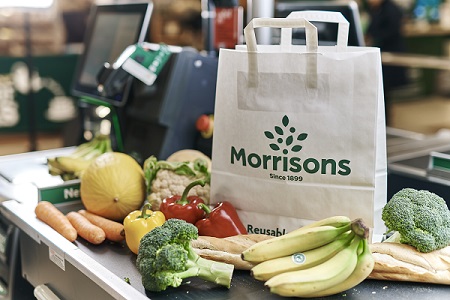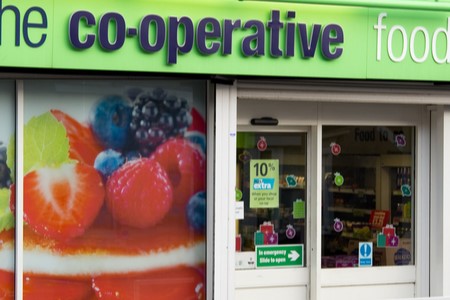In the face of criticism from the Which? Consumer group that almost 50% of packaging from supermarkets cannot be recycled, retailers have said that consistent household collections would help.
Confusing messages on labelling were cited by the consumer group as one reason material does not get recycled. But, for its part, the British Retail Consortium – which represents most food retailers, emphasised that it is keen to get government support for making labelling clearer and that consistent household collections would help.

Morrisons was found by Which? to be worst in terms of packaging – although it has recently launched paper bags for food
Which? analysed the packaging of a typical household shop of 46 of the most popular items from Aldi, Asda, Co-op, Iceland, Lidl, M&S, Morrisons, Ocado, Sainsbury’s, Tesco and Waitrose.
Researchers broke down each item’s packaging into its component parts and assessed whether each piece could be easily recycled. They found that the average percentage of packaging – including cardboard, glass and plastics – that could be easily put in household recycling bins was 52%.
The organisation said that it was “Equally concerning was that 42 per cent of the total supermarket packaging was labelled either incorrectly or not at all, making it difficult for well-intentioned consumers to dispose of correctly and increasing the chances of it ending up in landfill.”
Morrisons
Morrisons was accused of being “the worst offender” for the amount of packaging that could not easily be put in household recycling. Which? said: “Many of its items came with non-recyclable plastic film, which is generally designed to prevent food from going off and can reduce food waste. But this meant that 61% of the Morrisons packaging looked at was not easily recyclable.”
And, the Co-op came in for particular criticism over orange juice packaging. “Over half (58%) of the packaging materials used by Co-op were also not widely recyclable. Examples included an orange juice carton which was made of a combination of materials, whereas seven out of the 11 supermarkets used clear plastic bottles, which are easier to recycle.”
Eliminating
Giving the retailers’ view, Peter Andrews, head of sustainability at the British Retail Consortium said: “Our members are working hard to ensure all plastic packaging is reusable, recyclable or compostable, in line with the UK Plastic Pact, and are eliminating single-use packaging where they can, whilst ensuring it doesn’t lead to avoidable food or product waste.
“The retail industry is keen for government support in making recycling labelling clearer. To support this, it’s crucial that there is consistent household collection of materials across the UK so that customers can recycle a yogurt pot or a carton, for example, wherever they live.”
The post ‘Consistent collections needed’, retailers tell Which? appeared first on letsrecycle.com.
Source: letsrecycle.com Packaging



